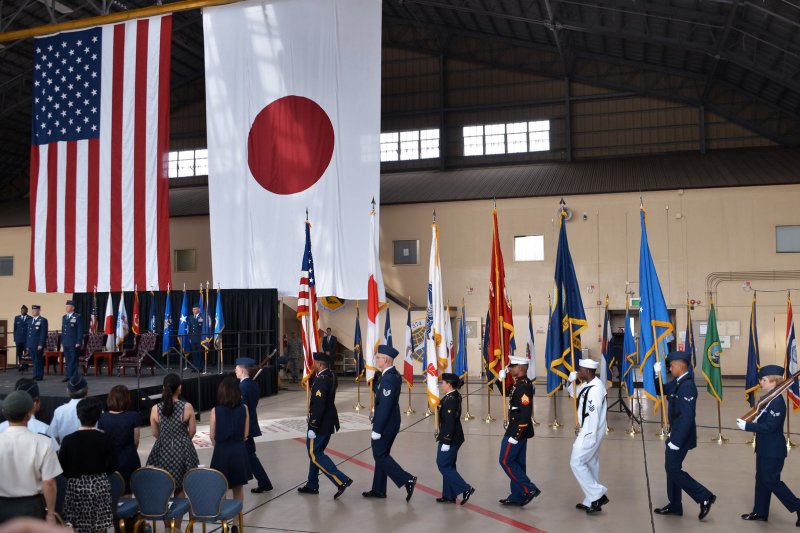Color guards walk during a change of command ceremony at Yokota air base in Tokyo, Japan, on June 5. The governor of Okinawa has said he will block the construction of a U.S. air base, and the Pentagon has refused to release a report on environmental contamination on the island. File Photo by Keizo Mori/UPI |
License Photo
TOKYO, Sept. 17 (UPI) -- Evidence of environmental contamination at a U.S. military base in Okinawa is being withheld at a critical time when opposition on the Japanese island is growing against the construction of a new air base.
Camp Kinser, a one-square-mile U.S. Marine Corps supply base near Okinawa's capital of Naha, is expected to be returned to civilians, but a report on possible toxic contamination has not been released despite a FOIA appeal and other demands, The Japan Times reported Wednesday.
Excerpts from the report that were released by the U.S. military stated that heavy metals and pesticides stored at the site have led to environmental contamination, and another section indicated more than 12.5 tons of toxic ferric chloride and dumped pesticides were in a landfill at Camp Hansen, central Okinawa.
Camp Kinser was a key storage site for retrograde chemicals from the Vietnam War. Those included were "insecticides, rodenticides, herbicides, inorganic and organic acids, alkalis, inorganic salts, organic solvents and vapor degreasers."
Manabu Sato, a professor of political science at Okinawa International University, said the return of Camp Kinser was a "celebrated feature of the so-called 'reduction of the U.S. military footprint on Okinawa.'"
"Thus the Pentagon wants to conceal the reality of contamination that would damage the political value of its return," Sato said. Under the Japan-U.S. Status of Forces Agreement, Washington is not required to allow Japanese officials to inspect its military bases.
Okinawa has increasingly expressed criticism of the U.S. military presence, and the island's governor recently demanded work on a new U.S. air base be stopped, The Guardian reported.
Takeshi Onaga was elected governor in 2014 after he vowed to stop construction of an offshore U.S. marine base on Okinawa's east coast.
"We will use every possible measure to block the construction of a new base in Henoko, as we promised during our election campaign," he said.
Tokyo is expected to pass its security bills on Friday, but protesters across Japan have been campaigning against the legislation that they say is "unconstitutional."















